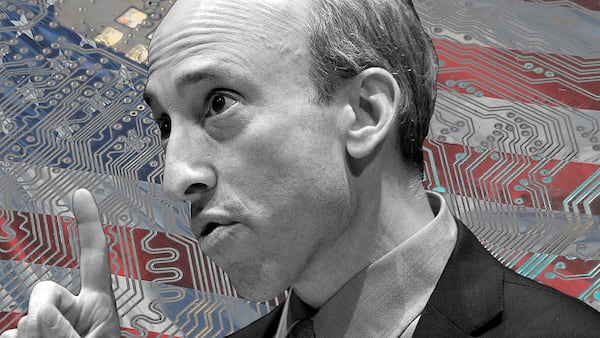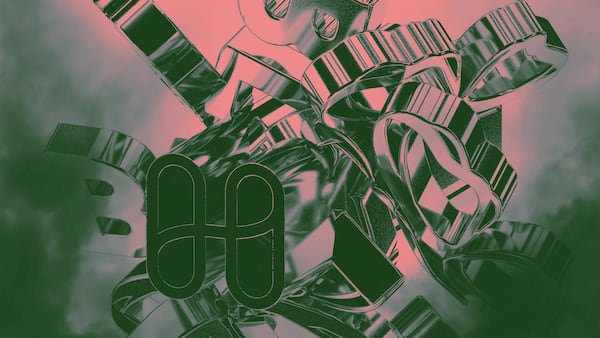- Angry depositors say Finblox covered losses from Three Arrows Capital with their money
- A lucky few made whole after complaining on social media
- CEO denies ripping off customers and and blames allegations on ‘disgruntled users’
On March 27, Vivek Patel woke up $15,000 dollars richer, and at first he didn’t know why.
Finblox, a crypto lender similar to the defunct Celsius, owed him the five-figure sum, Patel said. He had deposited money to Finblox last year to take advantage of the high returns it offered on various crypto assets such as Bitcoin, Ether, and Circle’s USDC stablecoin.
Then last June, Finblox told customers that it needed to redirect portions of their deposits into “reserve funds” and limit withdrawals. The reason: Finxblox had lost millions to the now-bankrupt trading firm Three Arrows Capital.
No explanation
Patel and many other customers didn’t buy the explanation. Now Finblox’s decision in 2023 to swap their money for homegrown tokens called FBX only made them madder.
Some, like Patel, complained on social media. And then voila! One day $15,000 materialised in his account with no explanation.
But Patel suspected Finblox was buying his acquiescence so it could minimise protests and stay in business after Three Arrows Capital failed in July 2022 owing creditors $3.5 billion.
NOW READ: Rookie DeFi traders bear the brunt of bot attacks: ‘Even small trades are at risk’
“Finblox collapsed when Three Arrows Capital went down but continues to run like nothing happened while refusing to pay millions of dollars of debt,” Patel told DL News.
Patel isn’t alone. More than 60 other Finblox customers who lost money or had their debt converted to FBX tokens have joined forces and documented Finblox’s activity online over the past year.
They’ve accused the company of fraud, executing an illegal token offering, moving jurisdictions to dodge regulators, and running a Ponzi scheme by attempting to raise new funds through a token sale to pay back previous depositors.
Their protests are similar to the outcry that has befallen Waves, the blockchain network that lost $530 million for investors after a series of suspicious transactions.
Exposure to Three Arrows
Finblox CEO Peter Hoang denies his customers’ allegations. “None of the actions taken were intended to misguide the affected users,” he told DL News in an email.
While he declined to disclose how much money Finblox lost in Three Arrows Capital, he said the company has been taking steps to strengthen its business and serve its customers.
“We have been very respectful of everyone affected and always try to come up with the solutions in their best interest,” Hoang said. “As a public facing platform, inadvertently we’ll have a small percentage of unhappy or disgruntled users.”
‘Finblox has eaten up my life savings. They’re refusing to return my funds that were deposited on their platform for less than a month.’
— Finblox customer
That’s not how a number of Finblox customers see it. DL News spoke to more than a dozen of them who allege the firm took away around 50% of their deposits.
“Finblox has eaten up my life savings,” said one customer who wished to remain anonymous. “They’re refusing to return my funds that were deposited on their platform for less than a month.”
NOW READ: London loses crypto ‘mojo and momentum’ as Revolut hints at Paris move
These customers told DL News their debt was converted to FBX despite them directing Finblox not to make the conversion. Meanwhile, the firm is accepting new deposits and is trying to raise funds through a token sale.
Patel was one of the lucky few who recovered their cash. He thought his money was gone, or in the best case scenario that he might get some back after a long legal fight.
Getting it all back without warning was “random and shocking,” Patel said. Days after receiving his funds and cashing out, Finblox abruptly closed his account without warning.
‘FUD spreaders’
Patel and three others are, as far as he knows, the only ones to get back in full the money they deposited to Finblox.
“My guess is that it’s easier for them if we are not users of their platform – they can claim we are FUD spreaders,” Patel told DL News.
Finblox started to take off in March 2022 when it raised $4 million in a seed round with participation from Coinfund, Rebel Fund, and Sequoia Capital India — an arm of the same venture firm that invested $150 million in FTX.
‘We have been very respectful of everyone affected and always try to come up with the solutions in their best interest.’
— Peter Hoang
Deposits on Finblox ballooned thanks to its prominent backers and the outsized yields it offered customers. One of the main ways Finblox generated yield was by lending out its depositors’ crypto assets. Finblox would evaluate and lend money to other crypto players with little to no upfront collateral.
Then last June, Finblox informed customers it was reducing the value of the money they had deposited in their accounts, plus limiting withdrawals to just $1,500 a month.
Six months later, Hong Kong’s Securities and Futures Commission placed Finblox on its list of unauthorised collective investment schemes. (Finblox was based in Hong Kong before moving to the British Virgin Islands this year).
NOW READ: ‘Treat restaking like AI’: Ethereum’s emerging trend sparks concerns about network stability
“Investors should exercise extreme caution if they plan to invest in any non-SFC authorised CIS. They may suffer significant or even total losses in such investments,” the agency said.
A message on the Finblox website says the company no longer offers its services to Hong Kong residents.
William Green, another Finblox customer who recovered his deposits, told DL News he also believes complaining about the situation may have publicly pressured Finblox into paying him.
“I was very vocal both on their support chat and their contact emails and on Twitter,” he told DL News. “It seemed those who were the most vocal were paid.”
Buyback programme
Green also said the official Finblox Twitter account blocked him after he complained about not getting his money back. Other Finblox customers DL News spoke to also said Finblox banned them on Twitter and Discord after they asked for their money back.
Hoang told DL News that the reason some customers were paid was because of a “test buyback scheme.”
“We did a test buy-back for some users who opted in the future buyback programme, we might do more buybacks in the future and it is at our discretion as a company to do that. It was not against our Terms of Use,” he said.
Hoang also said he “only blocked a few users who were using the expletives and publicly threatening the team.”
Switched its stance
Finblox’s policy of swapping debt for FBX tokens has left customers confused and feeling pretty raw.
In September, Finblox told depositors it would convert the money it owed them into FBX if they agreed to fill out a form. In February, Finblox switched its stance and required the same users to opt out of the conversion by filling in a different form.
As a result, customers who believed they had already opted out of the conversion suddenly realised Finblox was going to convert their debt into FBX.
But Finblox didn’t budge. Even before it distributed FBX to customers, the company used legal loopholes in its terms of service to justify converting their debt regardless of their wishes.
‘I didn’t consent to the USDC - FBX conversion but they did it anyway.’
— Dawid Maeser
“Absent the clear indication that you wish to opt-out from converting the reserved funds to FBX, submitted through the form, your reserved funds balance will be converted ex gratia into FBX tokens, in accordance with the agreement we have with you,” stated an email sent to one customer and posted in the Finblox Recovery Efforts Telegram chat.
Other Finblox customers DL News spoke to said the same thing had happened to them.
According to the Finblox website, holding FBX gives customers free withdrawals, reduced swap fees, and access to Finblox’s AI application, called AI-FinGPT. Many customers didn’t want to trade their crypto deposit debt for Finblox’s token.
No consent
Dawid Maeser, a customer who is currently involved in legal proceedings against Finblox, told DL News he lost $87,000 he deposited to the platform, which Finblox converted into FBX tokens.
“I didn’t consent to the USDC - FBX conversion but they did it anyway,” he said. In February, he and three other Finblox customers sued the company in Hong Kong.
Hoang said that the majority of customers didn’t have a problem with the conversion.
“Most of the users were happy with the solution and only a handful were not — as evidenced by a low number of complaints,” he told DL News. “We are happy to put you in touch with the users who were very supportive, but also suppressed and blocked by the same users you are probably speaking to.”
Six-month lockup
In February, Finblox launched a buyback programme for customers whose debt had been converted to FBX. Instead of waiting for their FBX to unlock and selling it on the open market, customers could instead sell it back to Finblox.
But many customers wondered where Finblox would get the money to buy back the FBX tokens it had given them.
At the same time, Finblox sold FBX through an ICO — or initial coin offering — with a six-month lockup, meaning those who purchased FBX through the ICO could not sell it for six months.
Ponzi scheme allegations
“Finblox said that they are allocating 30% of the net proceeds from the public token launch to the buyback,” J W, a Finblox customer who signed up for the buyback scheme, told DL News.
Many customers have pointed out that selling FBX to new investors through an ICO and using the funds to buy back tokens resembles a Ponzi scheme.
“Money will be coming from new users who will now indirectly be bearing debt without any knowledge of it,” Patel told DL News. “I can play along with Finblox in its Ponzi and make my money back when they launch the FBX token but it’s not right,” he said.
70% drop
Hoang told DL News that comparing Finblox’s buyback programme as a Ponzi scheme was “incorrect.” He said funds from the FBX token sale would be used to “expand the Finblox ecosystem,” but did not deny that some of the funds were being used to buy FBX from customers.
When FBX started trading on May 12, it was worth just over a cent. It has since fallen over 70%, and is 50% below the price Finblox offered it at through its ICO.
Many customers attribute this drop to Finblox selling FBX to recoup funds at the expense of new customers buying FBX through its ICO.




